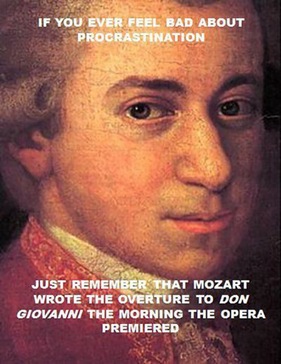
I found this image on a blog this week, and it just cracked me up. Hey, procrastination worked for Mozart! It’s OK if I wait until the LAST MINUTE because I’m so GOOD at it- a lifetime of experience under my belt!
Most humans are not gifted in the ways that Mozart was. In the film Amadeus, Mozart (played by Tom Hulce), when asked by Emanuel Schikaneder about his progress on Don Giovanni, said that the opera was finished. “In here, in my noodle. The rest is just scribbling.” That was how his brain wiring operated. He was able to create and write music in virtually any conditions or circumstances, retain it in his “noodle”, and access it at will. The rest of the human race isn’t quite so lucky. If you throw in ADHD, carrying a lot of detailed info, tasks, and projects around in your head without some structure to handle it is a surefire way to make your ADHD appear, and sometimes stay for an extended visit.
Many of us have used and probably still use the “Adrenaline Method”, hoping that the stimulation at the last minute will propel us to completion. Sometimes it works (probably less often than it used to). We learn to count on it, and our procrastination ensures we will need to use it. The problem is that it doesn’t work over the long haul. We learned it when we were young and life was simpler. We got through high school, and maybe college, using it. Then as adults, we keep painting ourselves into a corner because we didn’t use time management skills, weren't prioritizing, didn’t break down large tasks into sub-tasks, or we simply do the things that are more interesting and fun, but lower priority. The bigger, more important thing keeps getting pushed back, ignored (income taxes? relationship challenges? career choice?).
So we partner up with an ADHD coach, learn the skills to help us avoid procrastination, learn to more effectively open our eyes and our minds to how and when we’re at our best, and when ADHD rears its head. We do the work. It’s the best approach to manage your ADHD and move in the direction of what you consider success to be for you. When I saw and understood the truth in this is when I decided to become an ADHD coach.
The more we are informed by our behavior when our ADHD shows up, the less we’re ruled by it, and able to use the skills we learn to manage challenges like procrastination. When we improve at seeing (with more interest and less emotional attachment) how our ADHD brain wiring affects our behavior and decisions, what we see might not be laugh-out-loud funny, but it can certainly be amusing.
Procrastination? Don’t beat yourself up about it, go ahead and laugh about it… Just don’t put off doing something about it.
Most humans are not gifted in the ways that Mozart was. In the film Amadeus, Mozart (played by Tom Hulce), when asked by Emanuel Schikaneder about his progress on Don Giovanni, said that the opera was finished. “In here, in my noodle. The rest is just scribbling.” That was how his brain wiring operated. He was able to create and write music in virtually any conditions or circumstances, retain it in his “noodle”, and access it at will. The rest of the human race isn’t quite so lucky. If you throw in ADHD, carrying a lot of detailed info, tasks, and projects around in your head without some structure to handle it is a surefire way to make your ADHD appear, and sometimes stay for an extended visit.
Many of us have used and probably still use the “Adrenaline Method”, hoping that the stimulation at the last minute will propel us to completion. Sometimes it works (probably less often than it used to). We learn to count on it, and our procrastination ensures we will need to use it. The problem is that it doesn’t work over the long haul. We learned it when we were young and life was simpler. We got through high school, and maybe college, using it. Then as adults, we keep painting ourselves into a corner because we didn’t use time management skills, weren't prioritizing, didn’t break down large tasks into sub-tasks, or we simply do the things that are more interesting and fun, but lower priority. The bigger, more important thing keeps getting pushed back, ignored (income taxes? relationship challenges? career choice?).
So we partner up with an ADHD coach, learn the skills to help us avoid procrastination, learn to more effectively open our eyes and our minds to how and when we’re at our best, and when ADHD rears its head. We do the work. It’s the best approach to manage your ADHD and move in the direction of what you consider success to be for you. When I saw and understood the truth in this is when I decided to become an ADHD coach.
The more we are informed by our behavior when our ADHD shows up, the less we’re ruled by it, and able to use the skills we learn to manage challenges like procrastination. When we improve at seeing (with more interest and less emotional attachment) how our ADHD brain wiring affects our behavior and decisions, what we see might not be laugh-out-loud funny, but it can certainly be amusing.
Procrastination? Don’t beat yourself up about it, go ahead and laugh about it… Just don’t put off doing something about it.
 RSS Feed
RSS Feed